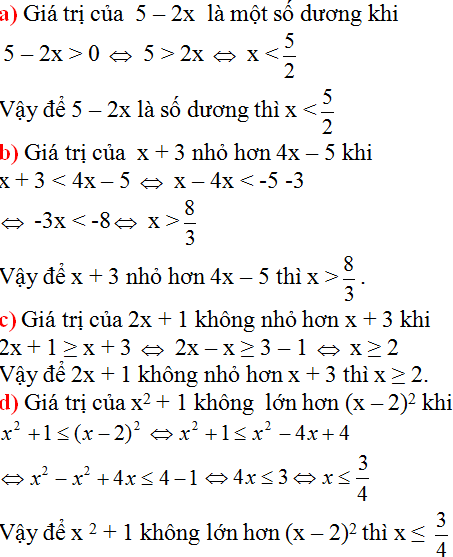Hãy nhập câu hỏi của bạn vào đây, nếu là tài khoản VIP, bạn sẽ được ưu tiên trả lời.

a) Để giá trị biểu thức 5 – 2x là số dương
<=> 5 – 2x > 0
<=> -2x > -5 ( Chuyển vế và đổi dấu hạng tử 5 )
\(\Leftrightarrow x< \frac{5}{2}\)( Chia cả 2 vế cho -2 < 0 ; BPT đổi chiều )
Vậy : \(x< \frac{5}{2}\)
b) Để giá trị của biểu thức x + 3 nhỏ hơn giá trị biểu thức 4x - 5 thì:
x + 3 < 4x – 5
<=< x – 4x < -3 – 5 ( chuyển vế và đổi dấu các hạng tử 4x và 3 )
<=> -3x < -8
\(\Leftrightarrow x>\frac{8}{3}\)( Chia cả hai vế cho -3 < 0, BPT đổi chiều).
Vậy : \(x>\frac{8}{3}\)
c) Để giá trị của biểu thức 2x +1 không nhỏ hơn giá trị của biểu thức x + 3 thì:
2x + 1 ≥ x + 3
<=> 2x – x ≥ 3 – 1 (chuyển vế và đổi dấu các hạng tử 1 và x).
<=> x ≥ 2.
Vậy x ≥ 2.
d) Để giá trị của biểu thức x2 + 1 không lớn hơn giá trị của biểu thức (x - 2)2 thì:
x2 + 1 ≤ (x – 2)2
<=> x2 + 1 ≤ x2 – 4x + 4
<=> x2 – x2 + 4x ≤ 4 – 1 ( chuyển vế và đổi dấu hạng tử 1; x2 và – 4x).
<=> 4x ≤ 3
\(\Leftrightarrow x\le\frac{3}{4}\)( Chia cả 2 vế cho 4 > 0 )
Vậy : \(x\le\frac{3}{4}\)

a) theo đề bài ta có
\(\dfrac{3x-2}{4}\ge\dfrac{3x+3}{6}\)
<=> \(\dfrac{3\left(3x-2\right)}{12}\ge\dfrac{2\left(3x+3\right)}{12}\)
<=> \(3\left(3x-2\right)\ge2\left(3x+3\right)\)
<=> \(9x-6\ge6x+6\)
<=> \(9x-6x\ge6+6\)
<=> \(3x\ge12\)
<=> \(x\ge4\)
vậy \(x\ge4\) thì thỏa mãn đề bài
b;c tương tự

a: \(\dfrac{2x-3}{35}+\dfrac{x\left(x-2\right)}{7}\le\dfrac{x^2}{7}-\dfrac{2x-3}{5}\)
\(\Leftrightarrow2x-3+5x\left(x-2\right)\le5x^2-7\left(2x-3\right)\)
\(\Leftrightarrow2x-3+5x^2-10x< =5x^2-14x+21\)
=>-8x-3<=-14x+21
=>6x<=24
hay x<=4
b: \(\dfrac{6x+1}{18}+\dfrac{x+3}{12}>=\dfrac{5x+3}{6}+\dfrac{12-5x}{9}\)
=>2(6x+1)+3(x+3)>=6(5x+3)+4(12-5x)
=>12x+2+3x+9>=30x+18+48-20x
=>15x+11>=10x+66
=>5x>=55
hay x>=11

A/ Theo đề ta có \(\frac{x}{2}-\frac{x-5}{10}\) không âm
\(\Rightarrow\frac{x}{2}-\frac{x-5}{10}\ge0\)
\(\Rightarrow\frac{5x}{10}-\frac{x-5}{10}\ge0\)
\(\Rightarrow\frac{5x-x+5}{10}\ge0\)
\(\Rightarrow\frac{4x+5}{10}\ge0\)
\(\Rightarrow4x+5\ge0\)
\(\Rightarrow4x\ge-5\)
\(\Rightarrow x\ge-\frac{5}{4}\)
\(\Rightarrow S=\left\{x\in R;x\ge-\frac{5}{4}\right\}\)
B/ theo đề ta có \(\frac{2x-3}{8}-\frac{x-5}{12}\) không dương
\(\Rightarrow\frac{2x-3}{8}-\frac{x-5}{12}\le0\)
\(\Rightarrow\frac{3\left(2x-3\right)}{24}-\frac{2\left(x-5\right)}{24}\le0\)
\(\Rightarrow\frac{6x-9}{24}-\frac{2x-10}{24}\le0\)
\(\Rightarrow\frac{6x-9-2x+10}{24}\le0\)
\(\Rightarrow\frac{4x-1}{24}\le0\)
\(\Rightarrow4x-1\le0\)
\(\Rightarrow4x\le1\)
\(\Rightarrow x\le\frac{1}{4}\)
\(\Rightarrow S=\left\{x\in R;x\le\frac{1}{4}\right\}\)

Bài 1:
a) Vì giá trị của biểu thức \(\frac{3x-2}{4}\) không nhỏ hơn giá trị của biểu thức \(\frac{3x+3}{6}\) nên \(\frac{3x-2}{4}\) \(\ge\) \(\frac{3x+3}{6}\)
TH1: \(\frac{3x-2}{4}\) = \(\frac{3x+3}{6}\)
=> (3x-2)6 = (3x+3)4
18x -12= 12x+12
=> x = 4
TH2: \(\frac{3x-2}{4}\) > \(\frac{3x+3}{6}\)
=> (3x-2)6 > (3x+3)4
18x-12> 12x+12
=> x \(\ge\) 5
b) Vì ( x+1)2 \(\ge\) 0; (x-1)2 \(\ge\) 0 mà (x+1) luôn lớn hơn (x-1) với mọi x nên không có giá trị của x thỏa mãn (x+1)2 nhỏ hơn (x-1)2
c) Phần c bạn cũng xét tương tự như phần a
TH1: \(\frac{2x-3}{35}+\frac{x\left(x-2\right)}{7}=\frac{x^2}{7}-\frac{2x-3}{5}\)
TH2: \(\frac{2x-3}{35}+\frac{x\left(x-2\right)}{7}<\frac{x^2}{7}-\frac{2x-3}{5}\)

1/ a, \(A=\dfrac{3}{2x+6}-\dfrac{x-6}{2x^2+6x}\)
\(=\dfrac{3}{2\left(x+3\right)}-\dfrac{x-6}{2x\left(x+3\right)}\)
\(=\dfrac{3x-x+6}{2x\left(x+3\right)}\)
\(=\dfrac{2x+6}{2x\left(x+3\right)}\)
\(=\dfrac{2\left(x+3\right)}{2x\left(x+3\right)}\)
\(=\dfrac{1}{x}\)
Vậy \(A=x\)
b/ Khi \(x=\dfrac{1}{2}\Leftrightarrow A=\dfrac{1}{\dfrac{1}{2}}=2\)
Vậy...
2/a,
\(A=\dfrac{5x+2}{3x^2+2x}+\dfrac{-2}{3x+2}\)
\(=\dfrac{5x+2}{x\left(3x+2\right)}-\dfrac{2x}{x\left(3x+2\right)}\)
\(=\dfrac{5x+2-2x}{x\left(3x+2\right)}\)
\(=\dfrac{3x+2}{x\left(3x+2\right)}\)
\(=\dfrac{1}{x}\)
Vậy....
b/ Với \(x=\dfrac{1}{3}\Leftrightarrow A=\dfrac{1}{\dfrac{1}{3}}=3\)
Vậy..

a) giải phương trình
\(\dfrac{2x^2-3x-2^{ }}{_{ }x^2-4}\) = 2
=>\(\dfrac{2x^2-3x-2}{x^2-4}\) = \(\dfrac{2\left(x^2-4\right)}{x^2-4}\)
=>2x2 - 3x - 2 = 2(x2 - 4)
<=>2x2 -3x - 2 = 2x2 - 8
<=>2x2 - 2x2 - 3x = -8 + 2
<=>-3x = -6
<=> x = 2
Vậy không tồn tại giá trị nào của x thỏa mãn điều kiện của bài toán
b) Ta phải giải phương trình
\(\dfrac{6x-1}{3x+2}\) = \(\dfrac{2x+5}{x-3}\)
=>x = \(\dfrac{-7}{38}\)
c) Ta phải giải phương trình
\(\dfrac{y+5}{y-1}\) - \(\dfrac{y+1}{y-3}\) = \(\dfrac{-8}{\left(y-1\right)\left(y+1\right)}\)
không tồn tại giá trị nào của y thỏa mãn điều kiện của bài toán

a, để 3x + 2 là số âm ta có :
3x + 2< 0
\(\Leftrightarrow\) 3x < -2
\(\Leftrightarrow\) x > \(\dfrac{-2}{3}\)
Vậy x > \(\dfrac{-2}{3}\) thì biểu thức 3x + 2 có giá trị là số âm
b,ta có :
\(\dfrac{5-2x}{6}\) < \(\dfrac{3+x}{2}\)
\(\Leftrightarrow\) 2( 5 - 2x ) < 6 ( 3 +x )
\(\Leftrightarrow\) 10 - 4x < 18 + 6x
\(\Leftrightarrow\) -4x - 6x < 18 - 10
\(\Leftrightarrow\) -10x < 8
\(\Leftrightarrow\) x > \(\dfrac{-4}{5}\)
Vậy x > \(\dfrac{-4}{5}\) thì giá trị biểu thức \(\dfrac{5-2x}{6}\) nhỏ hơn giá trị của biểu thức \(\dfrac{3+x}{2}\)